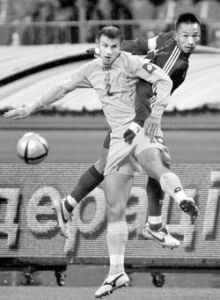2005 was a surprisingly successful year for Ukrainian soccer, but something was missing from the picture. Our national team seems to have achieved the coveted goal of qualifying ahead of schedule for the 2006 World Cup finals, but the results of the autumn matches — two draws with Georgia and Albania and a defeat by Turkey — although acceptable from the viewpoint of tournament strategy, still left a somewhat bitter aftertaste. Our state leaders also seemed to take no notice of the tens of thousands of fans, who were cheering the national team.
But last Wednesday everything fell into place. At first, President Yushchenko arrived at the base where the national team of Ukraine was training for this year’s final scheduled match, a friendly game with Japan. The president personally congratulated the players, coaches, and soccer federation officials on the successful outcome of the qualification tournament, urging them to carry on and win the world championship.
Later that evening, this country’s main stadium hosted the national teams of Ukraine and Japan, which will be taking part in the forthcoming world soccer fest in Germany. After acquitting themselves well (for a team like theirs) as the hosts of the last World Cup finals, the Japanese set themselves the goal to play at the same level again four years later. This task was assigned to Brazil’s Arthur Antunes Coimbra, better known as Zico, who replaced the Frenchman Philippe Troussier as Japan’s coach. The famous Brazilian national team player, who ended his career on the field in Japan, helped his “second fatherland” go through to the finals and then made a tour of Europe. On Oct. 8 Japan tied Latvia 2-2 in Riga. Naturally, Zico and his team wanted to come home with a victory, especially since they had easily beaten Ukraine in a similar friendly match three years ago.
But our current national team is not the one it used to be. Even without the group of key players headed by Andriy Shevchenko, who got sick right before the game, Ukraine got the upper hand over Japan whose team also did not field its strongest players. The more than 100 Japanese journalists crammed into the press stand looked dejected after the first few minutes of the game. When the Japanese players chose to press ahead with a rigid defensive pattern, ours responded with smartly organized attacks. When the Ukrainian side fielded Rotan, Nazarenko, and Venhlynsky in the second half, the pace of our attacks was sometimes frenzied. Yatsenko, a 20-year-old newcomer, made a surprisingly good show in the defense line: he looked like a worthy partner of Vashchuk, who is 10 years his senior. While Startsev was a reliable goalkeeper, Husin showed remarkable adroitness in the mid-field. He was the player destined to bring the team to victory by successfully delivering a penalty shot two minutes before the final whistle. This looked logical because this oldest Ukrainian player nearly scored two goals earlier in the game, when he hit the bar and failed to push the ball into a practically unguarded net. This victory marked the successful end of the 2005 soccer season, by far the best one in many years. Even coach Oleh Blokhin, who is usually sensitive to any sort of criticism, thanked everybody for their support, including journalists whose criticism was recognized as constructive.







